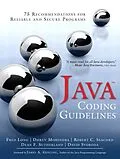"A must-read for all Java developers. . . . Every developer has a responsibility to author code that is free of significant security vulnerabilities. This book provides realistic guidance to help Java developers implement desired functionality with security, reliability, and maintainability goals in mind."
-Mary Ann Davidson, Chief Security Officer, Oracle Corporation
Organizations worldwide rely on Java code to perform mission-critical tasks, and therefore that code must be reliable, robust, fast, maintainable, and secure. Java(TM) Coding Guidelines brings together expert guidelines, recommendations, and code examples to help you meet these demands.
Written by the same team that brought you The CERT® Oracle ® Secure Coding Standard for Java(TM), this guide extends that previous work's expert security advice to address many additional quality attributes.
You'll find 75 guidelines, each presented consistently and intuitively. For each guideline, conformance requirements are specified; for most, noncompliant code examples and compliant solutions are also offered. The authors explain when to apply each guideline and provide references to even more detailed information.
Reflecting pioneering research on Java security, Java(TM) Coding Guidelines offers updated techniques for protecting against both deliberate attacks and other unexpected events. You'll find best practices for improving code reliability and clarity, and a full chapter exposing common misunderstandings that lead to suboptimal code.
With a Foreword by James A. Gosling, Father of the Java Programming Language
Autorentext
Fred Long is a senior lecturer in the Department of Computer Science, Aberystwyth University, in the United Kingdom. He is chairman of the British Computer Society's Mid-Wales Branch. Fred has been a visiting scientist at the Software Engineering Institute (SEI) since 1992. Recently, his research has involved the investigation of vulnerabilities in Java. Fred is also a coauthor of The CERT® Oracle® Secure Coding Standard for Java(TM) (Addison-Wesley, 2012).
Dhruv Mohindra is a technical lead in the security practices group that is part of the CTO's office at Persistent Systems Limited, India, where he provides information security consulting solutions across various technology verticals such as cloud, collaboration, banking and finance, telecommunications, enterprise, mobility, life sciences, and health care. Dhruv has worked for CERT at the Software Engineering Institute and continues to collaborate to improve the state of security awareness in the programming community. Dhruv is also a coauthor of The CERT® Oracle® Secure Coding Standard for Java(TM) (Addison-Wesley, 2012).
Robert C. Seacord is the Secure Coding Initiative technical manager in the CERT Program of Carnegie Mellon's Software Engineering Institute (SEI) in Pittsburgh, Pennsylvania. Robert is also a professor in the School of Computer and the Information Networking Institute at Carnegie Mellon University. He is the author of The CERT C Secure Coding Standard (Addison-Wesley, 2008), and is coauthor of Building Systems from Commercial Components (Addison-Wesley, 2002), Modernizing Legacy Systems (Addison-Wesley, 2003), The CERT® Oracle® Secure Coding Standard for Java(TM) (Addison-Wesley, 2012), and Secure Coding in C and C++ (Addison-Wesley, 2013).
Dean F. Sutherland is a senior software security engineer at CERT. Dean received his Ph.D. in software engineering from Carnegie Mellon in 2008. Before his return to academia, he spent 14 years working as a professional software engineer at Tartan, Inc. He spent the last six of those years as a senior member of the technical staff and a technical lead for compiler backend technology. Dean is also a coauthor of The CERT® Oracle® Secure Coding Standard for Java(TM) (Addison-Wesley, 2012).
David Svoboda is a software security engineer at CERT/SEI. He also maintains the CERT Secure Coding standard websites for Java, as well as C, C++, and Perl. David has been the primary developer on a diverse set of software development projects at Carnegie Mellon since 1991, ranging from hierarchical chip modeling and social organization simulation to automated machine translation (AMT). David is also a coauthor of The CERT® Oracle® Secure Coding Standard for Java(TM) (Addison-Wesley, 2012).
Inhalt
Foreword xi
Preface xiii
Acknowledgments xix
About the Authors xxi
Chapter 1: Security 1
1. Limit the lifetime of sensitive data 2
2. Do not store unencrypted sensitive information on the client side 5
3. Provide sensitive mutable classes with unmodifiable wrappers 9
4. Ensure that security-sensitive methods are called with validated arguments 11
5. Prevent arbitrary file upload 13
6. Properly encode or escape output 16
7. Prevent code injection 20
8. Prevent XPath injection 23
9. Prevent LDAP injection 27
10. Do not use the clone() method to copy untrusted method parameters 31
11. Do not use Object.equals() to compare cryptographic keys 34
12. Do not use insecure or weak cryptographic algorithms 36
13. Store passwords using a hash function 37
14. Ensure that SecureRandom is properly seeded 42
15. Do not rely on methods that can be overridden by untrusted code 44
16. Avoid granting excess privileges 50
17. Minimize privileged code 54
18. Do not expose methods that use reduced-security checks to untrusted code 56
19. Define custom security permissions for fine-grained security 64
20. Create a secure sandbox using a security manager 67
21. Do not let untrusted code misuse privileges of callback methods 72
Chapter 2: Defensive Programming 79
22. Minimize the scope of variables 80
23. Minimize the scope of the @SuppressWarnings annotation 82
24. Minimize the accessibility of classes and their members 84
25. Document thread-safety and use annotations where applicable 89
26. Always provide feedback about the resulting value of a method 96
27. Identify files using multiple file attributes 99
28. Do not attach significance to the ordinal associated with an enum 106
29. Be aware of numeric promotion behavior 108
30. Enable compile-time type checking of variable arity parameter types 112
31. Do not apply public final to constants whose value might change in later releases 115
32. Avoid cyclic dependencies between packages 118
33. Prefer user-defined exceptions over more general exception types 121
34. Try to gracefully recover from system errors 123
